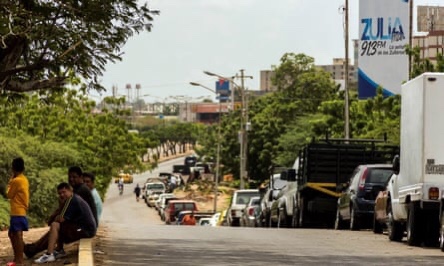A wave of demonstrations has erupted across Venezuela as angry citizens flout lockdown restrictions to demand an end to worsening shortages of everything from electricity and water to fuel and household supplies.
Since Sunday, more than 100 protests have broken out in at least 17 of the country’s 23 states, sometimes resulting in skirmishes with riot police.
Unlike previous waves of demonstrationsled by the political opposition and focused on ousting President Nicolás Maduro, the current unrest has largely taken place outside Caracas and protesters have not expressly called for a change of government.
Nonetheless, police and urban militias known as colectivos have deployed to crack down on protests and scores of people have been arrested.
After more than two weeks without running water at his home in the town of Independencia, Juan Rivas joined a demonstration that was quashed when police fired teargas.
“They don’t want us communicating with the rest of the country … we couldn’t protest, not just because of the gas but also because they send the colectivos,” he said.
“What we are seeing today is part of a long process of infrastructure collapse that has made people’s lives unbearable,” said Dimitris Pantoulas, a political risk consultant specializing in Venezuela. “As people outside Caracas see their lives deteriorate while the government doesn’t resolve their problems, the protests will get more intense and probably more violent.”
Although Venezuela has the largest proven oil reserves on the planet, collapsing infrastructure has led to a steep drop in production. As a result, the country’s heavy crude remains underground while motorists wait for hours in snaking queues outside petrol stations to fill up.
Wilmer Benavides, a cattle farmer who lives near Ciudad Guayana in south-eastern Venezuela, said he had shut down his business as he could no longer transport his goods to the city’s markets.
On Monday, Benavides waited in line while nearby demonstrators set up roadblocks in protest against the local governor’s latest fuel rationing measures: a maximum allowance of 10 litres per car and five litres per motorcycle. “That won’t get me anywhere,” he said. “It’s barely enough to last two days driving around town.”
Maduro, the leftwing successor to Hugo Chávez, is resisting a challenge to his legitimacy from Juan Guaidó, an opposition leader backed by the US and 50 other countries. The incumbent retains the key support of the military and remains allied with Russia, China and Cuba.
Guaidó has voiced some support for the protests, but he and other opposition leaders have largely remained silent. Some observers said that such reticence may be ill-advised.
“Calling people to hit the streets in the midst of a pandemic and humanitarian emergency could seem ‘off’,” said Maryhen Jiménez, a political scientist specializing in authoritarianism. “But there is a growing disconnect between Guaidó and ‘the people’ as he has focused more on international factors than organizing and mobilizing at home.”
US-led sanctions prohibit most trade with the embattled nation, though the first of three Iranian-flagged tankers entered Venezuelan waters on Monday, transporting some 270,000 barrels of fuel, which may alleviate some shortages.
But while Maduro remains in power, a harsh line against dissent is assured. This month, the United Nations accused his government of crimes against humanity in a scathing report that found Maduro and his top ministers to be responsible for extrajudicial killings and the systemic use of torture.
The local watchdog Foro Penal reported on Monday that at least 214 people had been detained and four killed while protesting during 2020.
Source: The Guardian

